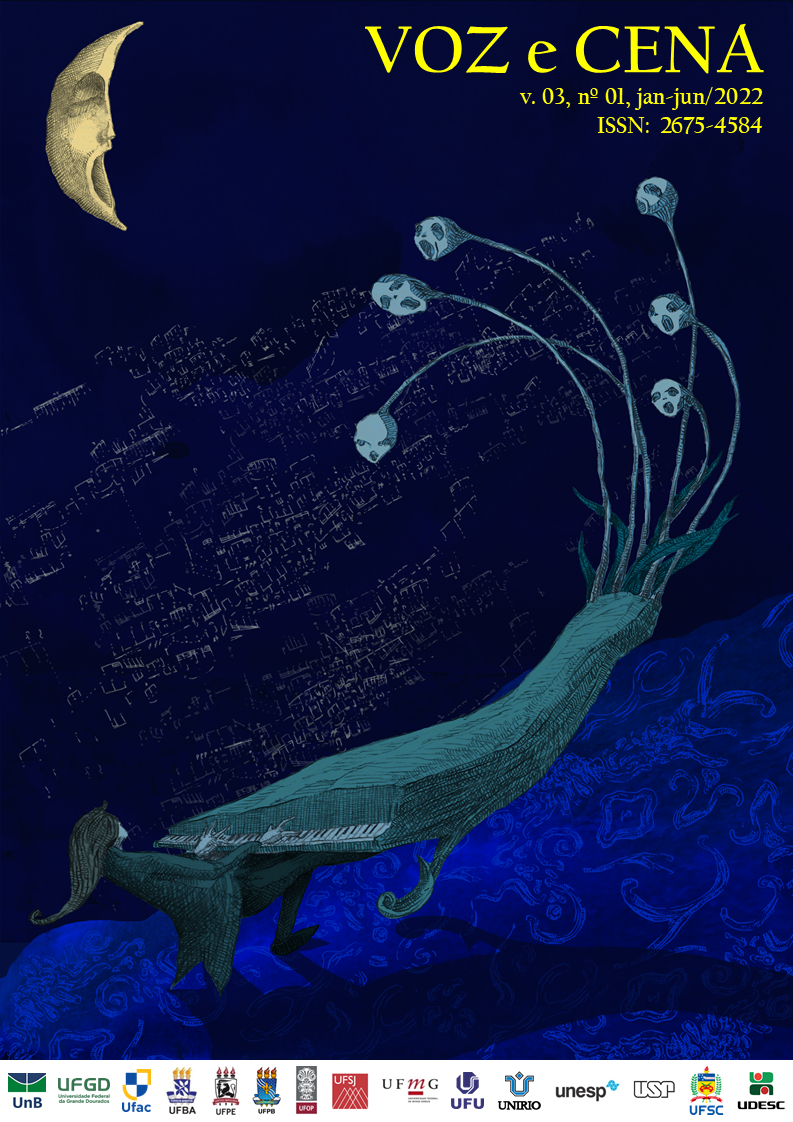The Actor's Voice
founding element of the scene
DOI:
https://doi.org/10.26512/vozcen.v3i01.42315Keywords:
Stanislavski, Voice, InterpretationAbstract
The proposal to study the place and value of the word in the Actor's Art is the starting point of this article. The initial hypothesis of this investigation is the understanding of the voice as a fundamental point for the constitution of the actor's presence in the scene. The Actor’s Voice: founding element of the scene intends to investigate the specific poetic-sound creation of the Actor's Art through the text The Actor Must Know How to Speak: a chapter found in the book My Life in Art by Constantin Stanislavski. In the text, we find evidence that the voice is the key element of acting and that the Actor, in fact, must know how to speak in line with elements of musicality that enrich the perception of the Art of speech.
Downloads
References
BARBA, Eugênio; SAVARESE, Nicola. A arte secreta do Ator - um dicionário de antropologia teatral. São Paulo: É realizações. 2012.
FERREIRA, Aurélio B. de Holanda. Novo dicionário da língua portuguesa, 2ª edição, Rio de Janeiro: Nova Fronteira, 1986.
FREUD, Sigmund. Conferências introdutórias à psicanálise (1916-1917). São Paulo: Companhia das Letras, 2014.
GROTOWSKI, Jerzy. Conferência realizada no Teatro Nacional de Comédia em 1974. Transcrição e Tradução de Celina Sodré, (não publicada), 2010
KNEBEL, Maria. Análise-Ação. Práticas das ideias teatrais de Stanislavski. São Paulo: Editora 34, 2016.
PAVIS, Patrice. Dicionário de Teatro. São Paulo: Perspectiva, 2001.
STANILAVSKI, Konstantin. La mia vita nell'arte. Firenze: La casa Usher, 2009.
SODRÉ, Celina. Jerzy Grotowski: artesão dos comportamentos humanos metacotidianos. Rio de Janeiro, 2014. Tese (Doutorado em Artes Cênicas) - Universidade Federal do Estado do Rio de Janeiro, Rio de Janeiro, 2014.
TCHERKÁSSKI, Sergei. Fundamentals of the Stanislavsky System and Yoga Philosophy and Practice. Stanislavski Studies 1. February, 2012. Traduzido para fins didáticos por Laédio José Martins (Dez. 2014/Jan. 2015). Disponível em: http://stanislavskistudies.org/wpcontent/uploads/Sergei_Tcherkasski_Stanislavski_studies_1.p df
TCHERKÁSSKI, Sergei. Stanislavski e o Yoga. São Paulo: É Realizações, 2019.
TOPORKOV, Vasily. Stanislavski in Rehearsal: The final years. New York: Routledge, 1979.
VIVÈS, Jean-Michel. A voz na clínica psicanalítica. Rio de janeiro: Contra Capa, 2018.
Downloads
Published
How to Cite
Issue
Section
Categories
License
Copyright (c) 2022 Voz e Cena (Voice and Scene)

This work is licensed under a Creative Commons Attribution 4.0 International License.
Readers are free to download, print and use the articles published in the journal, as long as there is always explicit mention to the authors and to the Voz e Cena journal and that there is no change in the original work. Any other use of the texts must be approved by the authors and the journal. By submitting a paper to Voz e Cena journal and having it approved, the authors agree to assign, without remuneration, the rights of first publication and the permission for the journal to redistribute that article and its metadata to the indexing and reference services that its publishers deem appropriate.
This work is licensed under a Creative Commons Attribution 4.0 International License.![]()


7.PNG)



